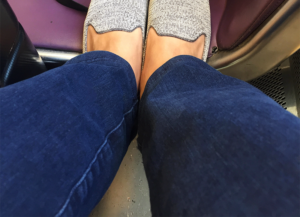 Amy and her husband have $900,000 saved for retirement. They’re 40 years old and plan to retire at 65. Due to a job change + pay cut, they might only have $10,000 per year to save for the next 25 years. Will this be enough, given their yearly expenses of $144,000?
Amy and her husband have $900,000 saved for retirement. They’re 40 years old and plan to retire at 65. Due to a job change + pay cut, they might only have $10,000 per year to save for the next 25 years. Will this be enough, given their yearly expenses of $144,000?
Janie wants to get a solar power system for her house, but isn’t sure how to pay for it. Should she borrow funds from her seven-month emergency fund, or use funds from a taxable brokerage account that were earmarked for retirement?
CJ and his wife netted $200,000 from the sale of their home. They aren’t sure when they’ll purchase their next home – their timeline could be as short as three years or as long as six years. Where should they keep the $200,000 to use towards a downpayment on their next home?
Brandon wants to retire in the next five to ten years. He contributes 20 percent to his Roth 401k. Since he can’t withdraw those contributions early, does it make more sense to contribute up to the match of his 401k and invest the rest in an IRA with the goal of doing a Roth conversion?
Anonymous “am I missing out?” wants to know: when is tax-loss harvesting worthwhile?
My friend and former financial planner Joe Saul-Sehy and I answer these questions on today’s episode. Enjoy!
CJ asks (at 3:07 minutes):
My wife and I live in the San Francisco Bay Area. We recently sold our primary residence, netting around $200,000 in cash with minimum taxable gains. We moved into a rental in another part of the Bay, but my wife wants to own again in the future – anywhere between three and six years from now. Our budget is $1M, and our downpayment will be $250,000 – $300,000, thanks to the proceeds from the sale of our house.
Where should we keep the $200,000 until we’re ready to buy? In a secure savings account? Invest it in a California muni bond fund, like VCAIX, or is that too risky? Or invest it more aggressively in VTI?
Anonymous “am I missing out?” asks (at 19:51 minutes):
For the past seven years, I’ve invested in equities, and I’ve never practiced tax-loss harvesting. Am I missing out?
Brandon asks (at 29:01 minutes):
I’m 36 years old and I plan to retire in the next five to ten years. My wife and I contribute 20 percent to our Roth 401ks. My understanding is that these contributions cannot be withdrawn early in the same way that our Roth IRA contributions can be withdrawn.
If that’s true, does it make more sense to only contribute up to our match in the 401k, fund two IRAs, and ultimately Roth convert those each year? It seems like we’d pay the same taxes and have more flexibility with this strategy, as we could begin withdrawing the conversion contributions within the next five years.
We’re disciplined savers – we’re debt-free and we’ve saved 40 percent of our income for the last six years. We have Roth IRAs, taxable accounts, and large traditional 401k balances. (I wish we could Roth convert these, but we’re still employed by these companies.)
For those who invest only in 401ks, wouldn’t this strategy – investing post-matched dollars into IRAs – grant more flexibility with the same tax-deferred benefits? Even if a person doesn’t plan to do a Roth conversion, they’d have the option to do one in the future.
Am I overthinking this?
Janie asks (at 37:21 minutes):
I’m thinking of buying a solar power system for my house, but I’m not sure how to pay for it. The cost of the system is about $12,000. Between the solar renewable energy credits and the electricity savings, we would save about $3,600 per year. The system would pay for itself within three and a half years.
Initially, we had three financing options:
- Buy it outright in cash
- Do a lease
- Finance it
The lease seems like the worst option. If we move, we’d have to get someone to take over the lease. We also wouldn’t receive the energy credits, which devalues the system. We’re also not huge fans of the loan, but without a loan, we’d have to tap our savings. We could save up for it, but that would wake us until next year, at which point the tax credits will decrease.
If we were to pay in cash, we have two options:
- Take the money out of our seven-month emergency fund, bringing it to five months
- Sell funds in a taxable brokerage account (balance: $50,000) that are intended for retirement
We’re okay taking money from our emergency fund as we would replenish it over the next six months. If one of us lost our jobs, we would also be able to cover our expenses.
How should we approach this?
Amy asks (at 51:41 minutes):
My husband and I are 40 years old and live in Brooklyn, NY with our two young kids. We have $900,000 saved in 401ks and Vanguard mutual fund accounts purely dedicated to retirement. We will continue to add to these accounts over the next 25 years – we plan to retire at age 65.
We spend $12,000 – $15,000 per month on living expenses, but our mortgage is $2,500 of that and we plan to pay it off before we retire. We estimate that living expenses in retirement will look more like $10,000 – $13,000 per month.
I just left my corporate job for a more fulfilling job, but less pay. I’m trying to think through the worst-case scenario to prepare our finances. For example, what if we can only contribute $10,000 per year toward our retirement for the next 25 years?
Assuming a return of five percent annually, would that still be sufficient, given our current balance? By my calculations, that would give us $4M, which is an amount we’re comfortable with.
We won’t touch our retirement funds until age 65, and we have a separate emergency fund and college savings account.
Thanks to our sponsors!
Backcountry
Want to get outdoor gear for the winter, but don’t want to step foot into a store? Backcountry.com has you covered. If you have questions about anything on their site, you can speak with a Gearhead 24/7 by phone. They’re former pro-athletes, Olympians, 100+ days-a-year skiers, and seasoned guides. Go to backcountry.com/paula and use the code paula to get 15% off.
Policygenius
Policygenius is an easy way to get life insurance. In minutes, you can compare quotes from top insurers to find the coverage you need, at a price you can afford. No matter how much or how little you know about life insurance, you can find the right policy at Policygenius.

My Betabrand pants are comfortable for travel days!
Betabrand
Most of us find ourselves in situations where we need to wear dress pants, whether it be for work, a conference, or a meeting. If only you could wear comfortable pants to everything, right? Well…now you can! Betabrand offers dress pant yoga pants, and they’re as awesome as they sound. Check out betabrand.com/paula and get 25% off one pair.
 Rothy’s
Rothy’s
Rothy’s shoes are stylish, sustainable, and comfortable for everyday wear, anywhere. They come in numerous styles, their lineup is updated often, and their flats, shoes, and bags are made from recycled plastic water bottles! Rothy’s offers free shipping + free returns and exchanges. Go to rothys.com/paula.